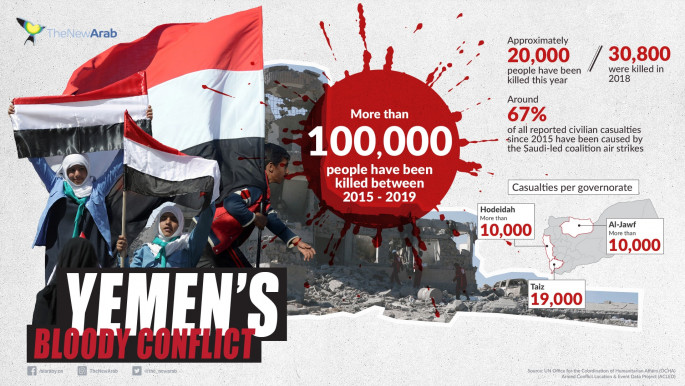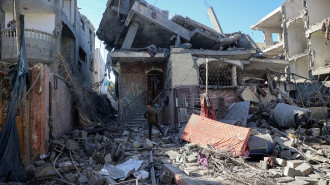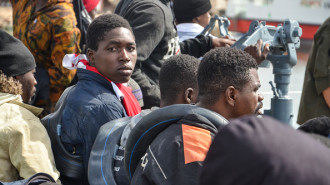Switzerland drops case against aerospace firm tied to Saudis despite Yemen war concerns
The Attorney General (OAG) confirmed reports on Sunday that it had closed its investigation into part of the matter, after determining that the Swiss company's actions did not violate the law.
The ruling, first divulged by the NZZ am Sonntag weekly, followed a probe that was opened in July, a month after the foreign ministry pressed charges against the company and banned it from further operations in the two countries.
The Swiss foreign ministry said at the time that the conduct of Pilatus in Saudi Arabia and UAE was "incompatible with the federal government's foreign policy objectives".
The Saudi and UAE air forces are key components of the Arab coalition that has bombed Iran-backed Houthi rebels in Yemen since 2015, a campaign that has partly triggered what the UN calls the world's worst humanitarian disaster.
In 2017, Pilatus signed a five-year maintenance contract on a fleet of 55 jets it sold to the Saudi military, while the UAE has bought 25 jets from the company which it uses to train pilots.
The company's work in the two countries "qualify as logistical support for armed forces" and must be "discontinued", the foreign ministry said in June.
At the same time, the ministry questioned whether Pilatus was in breach of the obligation to declare its activities.
That part of the matter was then passed on to the OAG, which according to the November ruling obtained by AFP found no law had been broken.
It noted that because the economy ministry had issued temporary export permits and the government was aware of the services Pilatus was providing, there was no need to officially inform Bern.
The foreign ministry did not immediately respond to requests for comment, and it remained unclear whether the OAG's decision to drop the case could impact the ban on Pilatus activities in Saudi Arabia and the UAE.
Twitter Post
|
Swiss parliamentarians recently passed two motions asking Bern to rethink its interpretation of the so-called "mercenaries law" and thus allow Pilatus to resume its activities, but the government rejected them, the ATS news agency reported.
Founded in 1939, Pilatus employs around 2,000 people in central Switzerland, with a focus on aircraft production and services.
Earlier this month, a group of human rights organisations filed a 300-page document to the International Criminal Court (ICC) accusing European arms companies - including British giant BAE Systems - of being linked to war crimes in Yemen's brutal war.
The human-rights groups, including Amnesty International and Campaign Against the Arms Trade, met prosecutors in The Hague to hand over the file.
"An ICC investigation would be an historic step towards holding arms company executives accountable for their business decisions," Patrick Wilcken, Arms Control Researcher at Amnesty International, said on Thursday.
Read more: UK election 2019: Where do political parties stand on the Middle East?
"The reality is that everybody involved in selling weapons to the Saudi Arabia/UAE-led Coalition bears some responsibility for how those weapons are used. This includes company executives as well as government officials".
 |
The dossier compiled by the rights' groups alleges that missiles, aircraft and other arms made by 10 companies "contributed to the capacity" of the Saudi-led coalition in the conflict.
The groups accused Saudi Arabia of bombing schools, hospitals and civilians in 26 strikes, which killed more than 135 civilians. Remnants of bombs made by companies in Europe were found at each of the sites.
BAE Systems is cited in the document as the principal supplier of Eurofighter Tornado and Typhoon jet aircrafts to the Saudi air force.
The UK arm of Raytheon, which manufactures Paveway IV guided missiles used in the conflict, was also mentioned.
The dossier says that BAE Systems "purposely intended" to supply Riyadh with arms even after company bosses would have been aware of an "abundance of reporting on the violations being committed", according to The Guardian.
France's Dassault and Thales, Italy's Leonardo, and Airbus companies in Spain and Germany were also referenced in the report.
"Any company executive can read a newspaper and understand that the human rights risk assessments of some European governments have failed catastrophically," said Patrick Wilcken.
"Company executives have had ample time and access to plenty of reliable information to reassess their decisions to supply the Coalition in the light of the horrific events in Yemen. Hiding behind flawed government decision-making is not good enough - now they could face criminal charges before an international criminal court."
The UK government has since 2015 doubled the value of arms sales to Saudi Arabia, which has been involved in a five-year bombing campaign in neighbouring Yemen.
Government data showed that London licensed £5.3 million ($6.85 million) worth of arms sales to Riyadh from March 2015 until March 2019, amounting to almost a 50 percent increase on the value of arms licenses, which stood at £3.8 million ($4.8 million) prior to the Yemen conflict.
A UK court ruled in June that it was illegal for the government to license weapons exports to Saudi Arabia without first assessing whether there was an "historic pattern of breaches of international humanitarian law" by the Saudi-led coalition that has fought Yemen's Houthi rebels since 2015.
Yemen's civil war has killed more than 100,000 people since 2015.
Follow us on Twitter and Instagram to stay connected







 Follow the Middle East's top stories in English at The New Arab on Google News
Follow the Middle East's top stories in English at The New Arab on Google News


